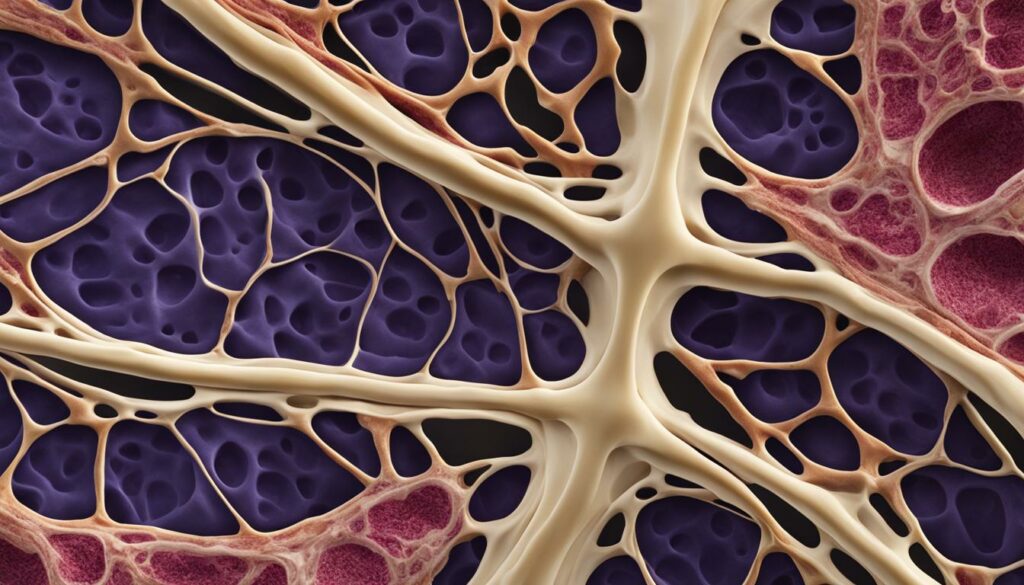Collagen is a vital protein that contributes to the structure, strength, and support of various tissues in the body. Understanding the key differences between skin collagen and bone collagen can help us appreciate their unique roles and importance.
When it comes to skin collagen, it is primarily responsible for maintaining the health and appearance of our skin. It provides structure, strength, and elasticity, helping to keep the skin firm and smooth. On the other hand, bone collagen plays a crucial role in providing support and strength to our skeletal system. It works in tandem with minerals like calcium and phosphorus to form the bone matrix.
While both skin collagen and bone collagen share similarities in terms of their composition and function, there are notable differences between the two. Skin collagen, predominantly composed of Type I collagen, is responsible for its elasticity and resilience. It helps to prevent the formation of wrinkles, loss of elasticity, and thinning of the skin that occurs with age. In contrast, bone collagen is composed of Type I collagen along with other collagen types, and its primary function is to maintain bone strength and prevent bone density loss.
Key Takeaways:
- Skin collagen is essential for maintaining skin health, elasticity, and preventing signs of aging.
- Bone collagen plays a crucial role in providing strength and support to the skeletal system.
- Skin collagen is primarily composed of Type I collagen, while bone collagen consists of Type I collagen along with other collagen types.
- Both skin collagen and bone collagen have distinct functions in the body.
- Maintaining a healthy lifestyle and consuming a well-balanced diet can support collagen production in both the skin and bones.
The Role of Collagen in Skin Health
Collagen plays a crucial role in maintaining the health and appearance of the skin. It provides structure, strength, and elasticity, helping to keep the skin firm and smooth. Collagen production in the skin decreases with age, leading to the formation of wrinkles, loss of elasticity, and thinning of the skin.
Factors such as sun exposure, smoking, and a poor diet can also impact collagen production. Consuming a well-balanced diet and protecting the skin from UV radiation can help support collagen production and maintain skin health.
Collagen supplements, such as hydrolyzed collagen, have shown potential benefits for improving skin hydration and elasticity. However, more research is needed to fully understand their effectiveness.
The Importance of Collagen in Bone Health
Collagen, a vital component of bone tissue, plays a crucial role in providing structure and strength to the bones. Working in synergy with minerals like calcium and phosphorus, collagen helps form the bone matrix, which determines the bone’s density and durability. As we age, collagen production in the bones decreases, leading to a decline in bone density and an increased risk of fractures and conditions like osteoporosis.
To maintain optimal bone health, it is important to support collagen production. One way to do this is by consuming a diet rich in calcium, vitamin D, and other essential nutrients that contribute to bone health. These nutrients provide the building blocks necessary for collagen synthesis in the bones. Additionally, regular weight-bearing exercises, such as walking or weightlifting, can stimulate collagen production and help maintain bone strength.
However, supporting collagen production is not the only factor in maintaining bone health. Avoiding tobacco and excessive alcohol consumption is equally important, as these habits can negatively impact bone density and increase the risk of bone-related issues.
Although collagen supplements may have potential benefits for bone health, more research is needed to confirm their effectiveness in preventing and treating bone-related conditions. Consulting with a healthcare professional can provide personalized recommendations on the use of collagen supplements and other strategies to support bone health.

Bone Collagen Benefits:
- Provides structure and strength to the bones
- Contributes to proper bone density and durability
- Supports fracture prevention and bone health
Collagen Production:
- Collagen production decreases with age
- Diet rich in calcium, vitamin D, and essential nutrients supports collagen production in the bones
- Regular weight-bearing exercises stimulate collagen synthesis
Additional Tips for Bone Health:
- Avoid tobacco and excessive alcohol consumption
- Ensure an adequate intake of calcium, vitamin D, and other bone-supporting nutrients
- Engage in regular weight-bearing exercises
- Consult with a healthcare professional for personalized recommendations
Collagen’s Role in Overall Health
Collagen is a versatile protein that goes beyond its importance in the skin and bones. It is also a vital component of various connective tissues, serving specific functions that contribute to overall health and well-being.
Connective tissues, such as tendons, ligaments, blood vessels, and organs, rely on different types of collagen to provide structure, strength, and support. Understanding the diverse functions of collagen underscores its significance in maintaining optimal health.
For instance, Type II collagen is crucial for joint health and the formation of cartilage, which acts as a cushion between bones and absorbs shock. Type IV collagen is found in the layers of the skin and plays a key role in wound healing. It helps to strengthen and repair damaged tissue, promoting healthy skin regeneration.
In addition to its contributions to joint health and wound healing, collagen also plays a role in other essential bodily functions. It is involved in supporting blood clotting, ensuring proper clot formation to facilitate wound healing and prevent excessive bleeding. Collagen also promotes the integrity of the intestinal lining, which is vital for digestive health and nutrient absorption.
The diverse functions of collagen indicate its wide-ranging impact on overall tissue repair and maintenance. By maintaining healthy collagen levels through a balanced diet and lifestyle habits, individuals can optimize their overall health and well-being.

Factors Affecting Collagen Levels and Tips for Collagen Preservation
Collagen, the essential protein responsible for maintaining the structure and strength of various tissues in the body, naturally declines with age. Beginning around the age of 20, collagen levels gradually decrease, leading to visible signs of aging and increased vulnerability to certain health conditions.
However, factors beyond age can further accelerate collagen decline, making it crucial to be mindful of various lifestyle choices and environmental influences. The following factors impact collagen production and breakdown:
- Smoking: Smoking not only damages the skin but also reduces collagen production, leading to premature aging and increased wrinkles.
- Diet: A diet high in sugar and refined carbohydrates can contribute to collagen degradation. The excess sugar molecules in the bloodstream attach to collagen fibers, causing them to become stiff and prone to damage.
- Ultraviolet (UV) Light Exposure: Excessive exposure to UV radiation from the sun or tanning beds accelerates collagen breakdown. UV rays generate free radicals that damage collagen and elastin, leading to sagging skin, wrinkles, and age spots.
- Autoimmune Diseases: Autoimmune conditions like rheumatoid arthritis, lupus, and scleroderma can adversely affect collagen levels. The immune system mistakenly attacks collagen, leading to inflammation and tissue damage.
- Genetic Mutations: In rare cases, genetic mutations can impact collagen production, resulting in connective tissue disorders such as Ehlers-Danlos syndrome and osteogenesis imperfecta.
- Health Conditions: Certain health conditions, such as diabetes, can interfere with collagen synthesis and proper tissue function.
To preserve collagen levels and promote overall skin and tissue health, it is essential to adopt collagen preservation tips, such as:
- Avoid smoking and reduce exposure to secondhand smoke.
- Limit consumption of sugar and refined carbohydrates.
- Protect the skin from excessive sun exposure by wearing sunscreen, protective clothing, and hats.
- Manage autoimmune diseases and other underlying health conditions effectively.
- Adopt a well-balanced diet rich in collagen-supporting nutrients, including vitamin C, amino acids (such as glycine and proline), zinc, and copper.
- Consider collagen supplements after consulting with a healthcare professional to determine their suitability and ensure adherence to recommended dosage.
Preserving collagen levels is crucial for maintaining youthful skin, strong bones, and overall well-being. By implementing these collagen preservation tips, individuals can help slow down the natural decline of collagen and promote healthier, more resilient tissues.
Conclusion
Collagen, the crucial protein in the body, plays a vital role in maintaining the health and function of various tissues, including the skin, bones, muscles, tendons, ligaments, and organs. It provides essential structure, strength, and support, contributing to overall well-being.
As collagen production naturally declines with age, it leads to the development of signs of aging and an increased risk of certain health conditions. While consuming collagen-rich foods cannot directly increase collagen levels in the body, adopting a well-balanced diet that supports collagen production is crucial.
Collagen supplementation, with options such as hydrolyzed collagen, shows promise in improving skin hydration, elasticity, joint health, and overall well-being. However, more research is needed to fully understand and substantiate their effectiveness. It is always advisable to consult with a healthcare professional before starting any collagen supplementation regimen to ensure its safety and suitability for individual needs.
In conclusion, collagen plays a significant role in maintaining the health of various tissues in the body. While collagen-rich foods and supplementation offer potential benefits, taking a holistic approach that includes a balanced diet, lifestyle choices, and professional guidance can help support collagen production and optimize overall health and wellness.
Understanding Skin Collagen vs Bone Collagen: An Informative Guide
FAQ
What is the difference between skin collagen and bone collagen?
Skin collagen and bone collagen have different functions in the body. Skin collagen provides structure and elasticity to the skin, helping to maintain its firmness and smoothness. On the other hand, bone collagen contributes to the strength and structure of the bones, supporting bone density and reducing the risk of fractures.
How does collagen impact skin health?
Collagen plays a crucial role in maintaining the health and appearance of the skin. It provides structure, strength, and elasticity, helping to keep the skin firm and smooth. Collagen levels naturally decline with age, leading to the formation of wrinkles, loss of elasticity, and thinning of the skin.
What are the benefits of collagen for bone health?
Collagen is a vital component of bone tissue, providing structure and strength. It works together with minerals, such as calcium and phosphorus, to form the bone matrix. Collagen production in the bones decreases with age, leading to a decrease in bone density and an increased risk of fractures and osteoporosis.
Are there different types of collagen in the human body?
Yes, there are different types of collagen in the body, each serving a specific function. For example, Type I collagen is found in the skin, tendons, ligaments, and bones, providing structural support. Type II collagen is essential for joint health and cartilage formation. Type IV collagen is present in the layers of the skin and helps with wound healing.
What factors can impact collagen levels in the body?
Collagen levels naturally decline with age, but certain factors can accelerate this decline. Smoking, a diet high in sugar and refined carbs, excessive sun exposure, autoimmune diseases, genetic mutations, and certain health conditions can all impact collagen production and breakdown.
How can I preserve collagen levels in my body?
To preserve collagen levels, it is essential to adopt a healthy lifestyle. This includes avoiding smoking, reducing sugar and refined carb intake, protecting the skin from excessive sun exposure, managing autoimmune diseases and other health conditions, and consuming a well-balanced diet rich in collagen-supporting nutrients.
